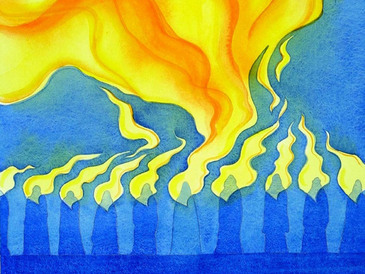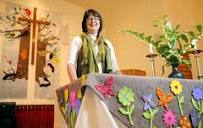 Genesis 21:8-21 Psalm 69:7-10, (11-15), 16-18 Romans 6:1b-11 Matthew 10:24-39 I recently had the joy of visiting with one of our WWII veterans about his upcoming trip to Washington DC. As this friend with a ready smile and twinkle in his eye shared, I could see the years rolling back. His voice softened as he mourned that fact that young men still go to war. I felt like he was watching thousands pass before his eyes. His final duty station was at an internment camp being liberated. Polish families held for as many as 4 years crowded into small cubicles, emerging at dinner time to hold out old tin cups and cans for dinner to be poured in. "As though they were pigs," he said. He and other soldiers found themselves unable to eat their own heartier dinners. So they began to share the real food on their plates. He said this with no pride, only a deep sense of decency. Our Jewish brothers and sisters talk in terms of Shever –breaking, and Tikkun-repairing. The work of humanity is repairing the brokeness we cause by incident and accident. Our stories from the bible this today look like win/lose situations. First we heard about the the conflict within Abraham's household. But Sarah saw the son of Hagar the Egyptian, whom she had borne to Abraham, playing with her son Isaac. So she said to Abraham, "Cast out this slave woman with her son; for the son of this slave woman shall not inherit along with my son Isaac." Now remember, it was Sarah's idea to "give" Hagar to Abraham in the first place in hopes of the son that she herself had not been able to give him. But now the gift that Hagar had given looked more like a liability, competition for carrying the household's legacy, and a painful reminder that another woman shared what she wanted for herself. Sarah wants to get rid of what hurts her. The matter was very distressing to Abraham on account of his son My inner feminist whispers, Hey Abraham, did you forget someone? Are you not distressed on account of Hagar too? But God said to Abraham, "Do not be distressed because of the boy and because of your slave woman; [and in perhaps the first bit of biblical marraige councseling] whatever Sarah says to you, do as she tells you, for it is through Isaac that offspring shall be named for you. In that time and culture a family’s legacy was its priority. Personal relationships and preferences took a back seat to the families' identity and survival. But the relationshipo that Abraham and Sarah minimized with dismissive labels, "this slave woman," God remembered as part of the family, "YOUR slave woman." As for the son of the slave woman, I will make a nation of him also, because he is your offspring." Justice was beyond Abraham’s control, he lacked what it would take to hold his household together. But justice was not beyond the power of the God who knows even the count of every single hair on each person's head. As the stories branched off, Ishmael would be incorporated into tradition of Islam, providing more sons of Abraham. So Abraham rose early in the morning, and took bread and a skin of water, and gave it to Hagar, putting it on her shoulder, along with the child, and sent her away. And she departed, and wandered about in the wilderness of Beer-sheba. So Hagar and Ishmael are exiled. Their experience is so different from the exodus of community following Moses into the wilderness together generations later. When the water in the skin was gone, she cast the child under one of the bushes. Then she went and sat down opposite him a good way off, about the distance of a bowshot; for she said, "Do not let me look on the death of the child." And as she sat opposite him, she lifted up her voice and wept. It doesn't sound as though it had occured to Abraham to share with her what he’d heard from God. But, while Sarah only heard God's voice through her husband, Hagar now hears straight from heaven. And God heard the voice of the boy; and the angel of God called to Hagar from heaven, and said to her, "What troubles you, Hagar? Do not be afraid; for God has heard the voice of the boy where he is. Come, lift up the boy and hold him fast with your hand, for I will make a great nation of him." Then God opened her eyes and she saw a well of water. She went, and filled the skin with water, and gave the boy a drink. Come. An invitation offered to exiles. A promise extended. A way from brokeness to wholeness. This is how bad news becomes good news. Come. God was with the boy, and he grew up; he lived in the wilderness, and became an expert with the bow. He lived in the wilderness of Paran; and his mother got a wife for him from the land of Egypt. Caution, this story is not a rationalization for absentee fatherhood. Its a story about God repairing brokeness. Its about God taking on the role of a father figure, present. Its about an alternative legacy hat lives on when at one point it had looked like nothing but death up ahead. In our second story, we hear Jesus illustrating the point that, as Rebekah Simon Peters writes, Jesus was a prophet. Prophets say hard things: he called out hypocrisy; he ruffled feathers; he distrubed the status quo. he wasn't cozy and cuddly. As things got more tense toward the end of his life, he called his students to 'take up their cross.' How's that for an end of life decision?.....Those who followed him before his death paid a price. families were spilt by the decision of whether to follow Jesus: James and John followered Jesus. So did their mother.....But Zebedee, the brother's father, stayed with the boats. Joanna, the wife of Chuza, Herod's stward, followed Jesus....But there's no word that Chuza ever did/ In light of this, I think Jesus' puzzling words begin to make sense. "Do not suppose that I have come to bring peace, but a sword...." ("The Jew Named Jesus," p. 49). Jesus is not prescribing conflict. He is describing the inevitable result of responding to the prophetic utterance, "God's kingdom has drawn near." I'll tell you a more recent story. Sherri Mandell heard about the bad news at her daughter’s engagement party, south of Jerusalem, the celebration stopped. But when she searched on line for “Israeli teenagers kidnapped”, it was not information on the 3 teens kidnapped last week in the West Bank that popped up but her own son’s name and face. Koby would have been 27 the next day, but he was 13 when he was killed in a cave not far from their home. The grief within her broke open all over again as she prays for the three teens now. After Koby died, Mrs. Mandell trained as a pastoral counselor, published a memoir of spiritual healing, began programs for other grieving parents: Jazz classes, psychodrama sessions, craft workshops, she and her husband began camp Koby for grieving children. They live in a land where resilient people have built up barren land and yet life is broken on broken. I sopke with a cousin yesterday and learned that 2 weeks ago, 1,200 fruit trees torn down on the farm of one of their Palestinian friends, to make way for a new settlement. What do we do with the pain that comes with trying to figure out how to live in this world? Shever –breaking Tikkun-repairing Do you remember when Lazarus came out of his tomb at the sound of his friend Jesus’ voice? Even as his friends rejoiced that he was returned to them, he still had to be unbound, unwound from the burial wrappings. …said Ms. Mandell, “There’s before and after, it’s a shattering and its also rebirth. Your whole world is destroyed. Its like Noah, the flood, something that is cataclysmic, almost like you have to go into some other mode in order to survive it, and then you come a different person. Imagining they could speak to the mother’s of the missing teens, women in the healing circles she has created say, “Be strong….Its OK to cry….we went through the worst, losing a child, but what you’re going through is even harder, the uncertainty. A person is known by how they respond to their pain. (NYTimes 6-21-14 “The Saturday Profile” by Jodi Rudoren) I was once given a refrigerator magnet with quote by 4 year old Nathanial Parizek, “You know it was a good day when you didn’t hit or bite anyone.’ Its still on my refirgerator. But I wonder, Is that what we’re willing to settle for, children of God? How do we fix the brokenness? Its not be surface “niceness” Sweden has the highest rate of domestic abuse in Europe, its suicide rate is among the highest in the world, and it has an alcohol problem. {But because the emphasis in churches is on “being nice,” it is people in the arts and theatre who are tackling Sweden’s dark side, not the church. –Giles Fraser, cited in Guardian, May 30, 2014. David Brooks, in NYTimes, 6-20-2014, reflects on the profound changes in Rwanda since death had that country in its grip in the mid 1990s. Rwanda’s per capita income has almost tripled since the 1994 genocide. Child mortality is down by two thirds, Malaria related deaths are down 85%. Most amazingly, people who 20 years ago were literally murdering each other’s family members are now living together in the same villages. Rwanda is far from paradise. Chaos was replaced by Paul Kagame’s strong man regime that “abuses human rights and rules by fear.” But here are some things that observer says have gone right and create the possibility of an increasingly open society: *The civil service is closely monitored for corruption. In Rwanda today, …local leaders following a tradition of “imihigo” in which they publically vow to meet certain concrete performance goals within, say, three years: building a certain number of schools, staffing a certain number of health centers….emphasizing local accountability[ and decentralizing power..] *People have learned to take pride in their commuity and care for the earth again. Plastic bags, for example are illegal. Kigali received the U.N. Habitat Scroll of Honor Award for innovations in developing a modern model city symbolized by improved garbage collection, upgraded public transport, zero tolerance to plastics, slum upgrading and beautification of streets and pavements. *“Umuganda refers to community work that is mandatory for every Rwandan between 18 and 65 years old, with the ability to work. If a person is above sixty 65 years of age and is willing to work they are able to participate as well,” Rose told The Delicious Day, a travel site. “Expatriates residing in Rwanda are also encouraged to participate in community works. It takes place every last Saturday of every month. -Frank Mutulu, The Atlantic Post, 10-2-2013 Women have been placed in the judiciary and in Parliament. Perhaps more important than anything else has been the ability to live side by side again becuase truth has been told and atrocities acknowledged. This is how bad news becomes good news. Many Maya Angelou stories are being shared after her passing. She’s best known for overcoming personal adversity and for her gift with words. But also a passionate social activist who, not long before her death, persuaded her senator to change her vote on marriage equality. –Think Progress, May 28, 2014, cited in CC 6-25-14 In her early life, Maya Angelou had a theological problem. As a child, she was afraid she had been responsible for her abuser’s death, because she “told.” If she spoke, someone else might die. So she held her voice for many years of her childhood, until an understanding neighbor drew her out. This is how bad news becomes good news. The “builder generation” is called that because, after surviving the great depression and WWII, they rolled up their sleeves and built the institutions that created the world most of us know and often take for granted. “It’s always been that way” for most of us: hospitals, schools, churches, roads, civic organizations….. This is how bad news becomes good news, how brokeness is repaired. There’s a lot of looking over our shoulders to see who at the top will revive the church. But the truth is that revival comes from a meeting of hearts set ablaze by the Holy Spirit, not a re-organization plan. What’s your first impulse when you’ve been hurt? Do you want to be healed? Or has your hurt become your most cherished companion? I come to bring a sword, Jesus said, that cuts through anything separating death from life. The longer brokenness lingers, the more letting it go feels like a surgical procedure. It’s not a matter of “getting over it.” It’s a matter of getting on with it, with life. Because the alternative deadens the soul and kills communities. Grief and loss endure, but we have a choice of whether they spread like a cancer within us, or compost into something that feeds flourishing life. There comes a time in everyone’s life when we have to ask ourselves, “How long am I prepared to be defined by my hurt?” Do I want to be healed? The great Physician is right hear, ready and waiting when we say the word. Paul wrote: 6:11 So you also must consider yourselves dead to sin and alive to God in Christ Jesus. And Christ himself said, Those who find their life will lose it, and those who lose their life for my sake will find it. Lose yourself a little this summer, break out, reach across, laugh and cry together in Christ’s healing presence. This is how bad news becomes good news. This is how broken is made whole. Meditation: Shatter Me by Lindsey Sterling
0 Comments
 Pentecost John 7:37-39, Acts 2:1-21, Numbers 11:24-30, 1 Corinthians 12:3b-13 That day, On the last day of the festival, the great day, while Jesus was standing there, he cried out, "Let anyone who is thirsty come to me, and let the one who believes in me drink. As the scripture has said, 'Out of the believer's heart shall flow rivers of living water.'" Fire and Water, the two great life giving forces. MELT ME, MOLD ME, FILL ME, USE ME, Water forming the cloud out of which God spoke to Moses. Fire catching his eye as God spoke through a burning bush years before. .....and [God] took some of the spirit that was on [Moses] and put it on the seventy elders; and when the spirit rested upon them, they prophesied. But they did not do so again. Two men remained in the camp, one named Eldad, and the other named Medad, and the spirit rested on them; they were among those registered, but they had not gone out to the tent, and so they prophesied in the camp. And a young man ran and told Moses, "Eldad and Medad are prophesying in the camp." (oh no!!!!!) And Joshua son of Nun, the assistant of Moses, one of his chosen men, said, "My lord Moses, stop them!" But Moses said to him, "Are you jealous for my sake? Would that all the Lord's people were prophets, and that the LORD would put his spirit on them!" That Day, Joshua learned an important lesson, God’s Spirit will work where God’s Spirit will work. With the lesson learned, Joshua would be the one to pick up Moses’ mantle, leading the people into the promised land. MELT ME, MOLD ME, FILL ME, USE ME, All [God’s gifts] are activated by one and the same Spirit, who allots to each one individually just as the Spirit chooses. Just as the body is one and has many members, and all the members of the body, though many, are one body, so it is with Christ. For in the one Spirit we were all baptized into one body--Jews or Greeks, slaves or free--and we were all made to drink of one Spirit. That day, the churchbuiding Paul poured the fire of God’s driving purpose and the water of God’s sustaining presence on an early church splintered into factions and personal preferences. This, Paul declared, this is what it means to be the body of Christ- To each is given the manifestation of the Spirit for the common good. MELT ME, MOLD ME, FILL ME, USE ME, This Day. The global village is experiencing something that looks suspiciously like Pentecost. *We find ourselves speaking to one another in other languages as easily and confusingly as activating translation software on our computers. *We find ourselves crossing linguistic lines with shared images. *We are newly aware of this one fragile, yet resilient earth home. *We are swept by winds of change, invigorating and unnerving. *We are relearning how to see the holy in each human being touched by the sacred finger flame of their Creator. *And we are relearning how to see the holy in all of God’s purposeful creation, animal, vegetable, mineral. *We are seeking God’s desire in places broken by human incident and accident. *There is less talk of building institutional religion and much more talk of the “Spirit’s” work…. of “spiritual” human experience. *There is an ingathering and an outpouring of those who follow Christ, a new Pentecost, a new reformation underway. Christianity has never been static, but has had, in changing times, to re-invent itself. From Jewish reformers to Constantine’s rule to monasticism to medieval “practice makes perfect” to reformation “back to basics,” We don’t completely leave the old forms behind. When television became popular some declared it would be the death of radio. Handwritten notes are newly appreciated after being inundated by emails. Old religious wineskins remain while new ones flourish. But there is a very sense in which the old wineskins cannot bear to hold all the new that God pours into the world. This day, we are not just being re-arranged, we are being changed. If we listen beyond our walls and beyond our fears, there is no doubt that a spiritual revolution is sweeping across humanity, carried by newly empowered voices across newly constructed lines of communication. The most joyous Christian communities in the world are in the global south, where people have the least control over their lives, and the least to lose. One of my seminary professors tells of climbing a mountatin in South Africa to sit all night with thousands of other so that they could greet the sun with songs of praise to Jesus. In Seoul and in Korean villages millions of Christians pray for several hours each morning, beginning at 3:00 am. We catch glimpses from our place on the western edge. This day, churches all around us are struggling to keep old wineskins intact: buildings, doctrines, ways of “doing” worship or Sunday School or administration. This day, Denominations that birthed hospitals, colleges, schools, social agencies, the safety nets of our society are being told by independent boards that they are not needed any more. What are we when our children grow up? But people all around us in our communities, inside and outside church walls, are feeling the Spirit’s wings brush by. Is there a word from Christ to his followers in the midst of disorienting change or are we to be left spinning in spiritual vertigo until it all settles down to a predictable pattern again? On that day, 2,000 years ago, Peter found his voice in the midst of the chaos that birthed the church. (Mind you, birthing the church was not the goal. Church birth was the tool created to step toward the coming Kin-dom of God. ) As Peter found his voice, he raised it up-offered it as a sacrifice in union with Christ’s sacrifice for him. Peter spoke to the people, the Christ followers, and the not-yet Christ followers. He pointed to what God had promised through long ago prophets and through their friend Jesus. What Peter might say to us? 1. Past leaders are gone. Honor their memory, pick up their legacy, and stop trying to do exactly what they did. 2. The future that drew them is wide open, walk toward it. 3. Jesus’ Spirit makes us all lead with the gifts God gives. Get to it. 4. Stop wondering if.... what... when...... God offers Christ now. God invites you. RSVP is required. However we hear it, when Christ’s call pierces the think armor of old expectations and habits, we cannot help but respond. “So now what do we do?!” Simple answer: “Change your life.” In other words, see the source, the Spirit, and ask Christ to fit you to the course of where it is flowing. It doesn’t matter how old or young you are, the Prophet Joel said that your young men and your old men would be in this together. It doesn’t matter what gender you are, sons and daughters, Joel said. The promise is targeted, sent to the heart, of you and your children, and also, by the way to those far away who are so much closer now than ever. Everyone was simply in awe. They threw in their lots together, every meal became a celebration, exuberant and joyful, as they praised God. That day, Church was born. This day, church is born. Faith was and will be nurtured. Lives were and will be changed. Christ has and will come. We are invited to join him. MELT ME, MOLD ME, FILL ME, USE ME, (repeat) |
Karen L MunsonUnited Methodist Pastor & Liturgical Artist Archives
September 2015
Categories
All
|



 RSS Feed
RSS Feed